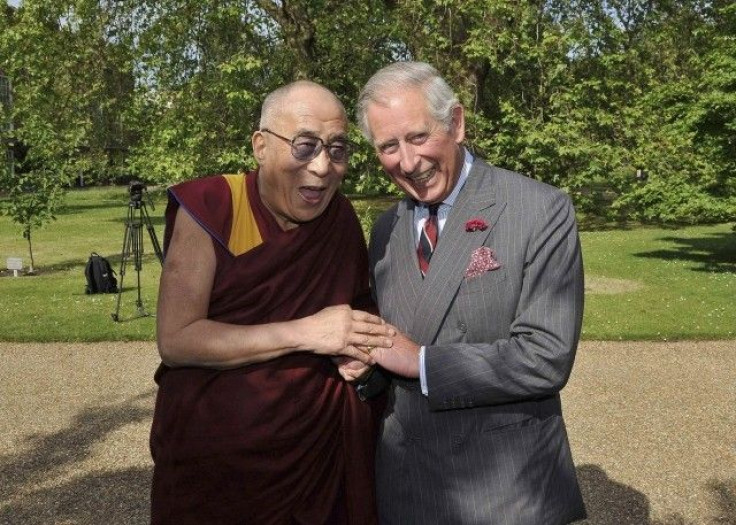Dalai Lama Says Mao Considered Him ?As A Son,? Recalls His Attraction To Communism

Despite the long-standing tensions with China over the Tibetan autonomy, the Dalai Lama, who is on a visit to the UK for public talks and appearances, talked fondly of his close relations with Mao Zedong, saying the Chinese revolutionary leader considered him as a son.
Recounting his close relationship with Mao during the Andrew Marr Show on BBC Sunday, the Tibetan spiritual leader said Mao would make him sit by his side at formal dinners and serve him the way that was considered the best honor in Chinese tradition.
He (Mao) appears to me as a father and he himself considered me as a son, the Dalai Lama said. (We had) very good relations. The only problem was that on many occasions, when official dinners were held, Chairman Mao always used to bring me to his side. So, then as Chinese tradition, Chairman Mao himself would use his chopsticks to put some food in my plate. So, in a way it was a great honor, but in a way I feel little fear...he coughing too much, a chain smoker, so I might get some germs (laughing).
The Dalai Lama said he was attracted by some aspects of Communism, adding that Marxist theory had an emphasis on equal distribution.
When I was in China, I learnt Marxist economy theory, which has an emphasis on equal distribution, rather than just profit. Since we human beings created this (economic) problem, we also have the ability to overcome it. In spite of our difficulties, we should not give up our hope...we must keep our self confidence, that is very important, the Dalai Lama said.
The 76-year-old Nobel laureate fled to India during the 1959 Tibetan uprising, where he denounced China and established the Tibetan government-in-exile. Speaking about coming back to Tibet, he said older Tibetans wanted him to return as soon as possible before their death, but other politically sensible people believed he should remain outside in a free country under the present circumstances.
Their message is that (by remaining outside Tibet), you can do more for us. If you return, you will yourself become like a prisoner, he said.
In another interview with a magazine in Scotland Saturday, the Dalai Lama criticized the Chinese government for trying to conceal reality through the morally wrong censorship policy.
Totalitarian regimes like China's have for several decades depended far too much on cruelty, so fear and distrust are part of their atmosphere. This is why they try to conceal reality, the Dalai Lama said, according to a statement published on the website of the Central Tibetan Administration.
The 1.3 billion Chinese have a right to know the reality of their situation and they have the ability on that basis to judge right from wrong. For this reason, censorship and restricting people's movements are morally wrong and limit their creativity, the Dalai Lama said.
This approach is short-sighted and has to change. Prime Minister Wen Jiabao too has spoken about the need for change and even democracy in China, he added.
Addressing Tibet's struggle for autonomy, the Dalai Lama said, We are conducting a non-violent struggle in the spirit of reconciliation. It is worth supporting, because it must succeed. Our failure will support those who argue that you can only achieve your goals through force and violence.
The Dalai Lama said self-immolations of Tibetans are very sad, but added that it showed Tibetans' commitment towards non-violence since those who took to setting themselves on fire didn't want to harm others. However, they (self-immolations) are a clear sign of desperation, he added.
The Tibetan leader's trip to Britain to spread the message of non-violence and compassion has reportedly angered the Chinese leadership. His visit to Scotland was marred by an accusation that Lord Provost Bob Duncan of Dundee canceled his speech at a specially arranged event Friday after meeting with the Chinese consul general to Scotland. The Chinese consul general reportedly met with council leaders from all three cities - Edinburgh, Dundee and Inverness -- scheduled for Dalai Lama's tour, earlier last week, a BBC report said.
Responding to Scottish opposition's claim that China had put pressure on Scotland's SNP government over the Tibetan leader's visit, deputy first minister Nicola Sturgeon said, I think it is unfortunate if anyone in any party seeks to politicize the visit of the Dalai Lama to Scotland, and the reason for that is because it is not a political or a state visit - the Dalai Lama is making a pastoral visit to Scotland.
© Copyright IBTimes 2024. All rights reserved.












